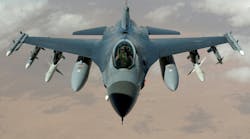John Keller, Editor in Chief
Prospects are dimming for growth in U.S. defense spending over the next few years, as military operations in Iraq and Afghanistan increasingly become contentious political issues best handled with extreme caution by those seeking office or running for re-election.
As the war in Iraq has become a political sore spot, even among some U.S. conservatives, we can expect the Pentagon’s leaders to hunker down to the status quo on military spending at least through the presidential election in November 2008, and potentially for longer than that, depending on the depth of the nation’s war-weariness through late 2008 and early 2009.
In short, the best we can realistically expect through probably 2009 is flat defense spending, and perhaps even selected cuts in big-ticket programs like the Army’s Future Combat Systems, shipbuilding programs, and military aircraft.
The Democrats control Congress. The anti-war wing of that party, frustrated by years of what they consider to be ill-advised conflicts in Iraq and Afghanistan, is looking for political payback. Attacks on military spending are likely to result. With that in mind, we can expect military authorizations and appropriations to be in the crossfire for several years.
Members of Congress-particularly those who have been there for a while-are watching closely to see how the national mood develops on military operations in the Middle East. We can expect most of them to do little until at least after the elections out of fear that any visible action they take could backfire.
Already we are seeing a few Republicans breaking ranks with President George W. Bush on the war in Iraq. These members believe they have no choice other than opposing the president if they hope to retain their seats in the 2008 elections. Look to see more of this from Senators and representatives who represent states and districts with strong anti-war sentiment.
We might start to get an idea of the prospects for defense spending long term during the first two months of calendar 2009. The new congress and the new president-whoever he or she may be-take office then, with the fiscal year 2010 U.S. defense budget request to follow shortly after.
The pending elections leave us with three or four potential outcomes: 1) a Democrat-controlled Congress with a Democrat president; 2) Democrat Congress with Republican president; 3) a split Congress with a Democrat president; 4) a Republican Congress with a Democrat president; 5) a split Congress with a Republican president; or 6) a Republican Congress with a Republican president.
I don’t see both houses of Congress flipping from Democrat to Republican anytime soon, so I think we can eliminate numbers five and six right off the bat.
I could see the Republicans perhaps taking either the House or Senate in 2008, but let’s face it, that possibility is becoming increasingly remote. We will have had a Republican in the White House for eight years when 2008 election rolls around. President Bush continues to slip in popularity polls, and absent some extraordinary event I don’t see President Bush able to sway congressional elections to the Republicans.
I think the combination of war-weariness and sagging Bush popularity scores both houses of Congress to the Democrats in 2008. Congress is likely to retain a Democrat majority largely hostile to military operations in Iraq, Afghanistan, or anywhere else. Eliminate possibilities three and four.
That leaves us possibilities one or two-a Democrat-controlled Congress with either a Democrat or Republican president.
American voters are funny; they always want it both ways. In 2008 they will vote on the one hand to end the wars in the Middle East. They will do this by voting for Democrats in congressional elections.
On the other hand, however, voters realize we live in a dangerous world, rife with terrorism, rogue states like Iran, North Korea, and Venezuela, and emerging superpowers and economic competitors like China, so they also will vote for strong national security. They will do this by voting for the Republican for president.
My prediction, then, is a Republican president and a Democrat-controlled Congress after the 2008 elections. As far as defense spending is concerned, that essentially lead us right back to where we are today-an environment of partisan deadlock, and little prospects for substantial change anywhere-least of all in military spending, but also in areas like immigration, social security, taxes, and health care.
Assume for a moment that the 2008 elections will leave us with a Democrat Congress and a Republican administration. By the presidential inauguration, the military pullout from Iraq will be in full swing, and the wars in Iraq and Afghanistan will be winding down. Experts have been predicting this for about the last two years.
War fatigue in the general population, however, will linger as strongly as ever, assuming, however, that no major terrorist attacks will have been perpetrated on American soil up to that time. In short, it’s likely that the average man on the street after the 2008 elections will want the troops home, and will not want to hear or think about military matters for a good long time.
People are tired of being reminded of how much the military costs. The number of U.S. soldiers killed and wounded in the Middle East is painful to contemplate. Look for military issues to take a low profile at least through 2010, and perhaps until the presidential elections of 2012. Forward-looking military research programs could thrive in this environment-providing they can get their work done quietly.
Military spending post-2008 will not drop off sharply; it is likely to remain flat. It even might drop off slightly, especially if a Democrat can pull out the presidential election. Large defense programs will be tempting targets for members of Congress eager to show their constituents that they are ready to head in a new direction.
One potential bright spot for defense spending might be homeland security. If voters are tired of war, but want to retain a strong national defense, then members of Congress may look favorably homeland security spending-particularly if new programs hold the promise of keeping American troops at home.


